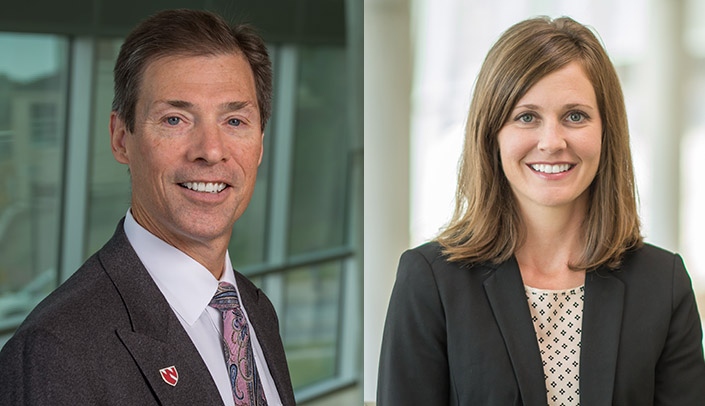While UNMC has a strong presence in central and western Nebraska, a legislative interim study is looking at whether that could be increased to address health workforce concerns of the state.
Legislative Resolution (LR) 392 examines the feasibility of increasing the capacity of pre-health academic and research undergraduate programs at the University of Nebraska at Kearney to help expand the permanent presence of UNMC in central and western Nebraska. The interim study is sponsored by Sen. John Lowe of Kearney.
On Monday, Nicole Carritt, director of rural health initiatives, and Kyle Meyer, PhD, dean of the College of Allied Health Professions (CAHP), presented information to members of the Appropriations Committee about UNMC’s Kearney-based health care programs.
Already, UNMC has a strong presence in central and western Nebraska through:
- The College of Nursing, which established a Kearney division almost 30 years ago and has expanded its undergraduate and graduate programs at the Health Science Education Complex (HSEC), which opened on the University of Nebraska at Kearney campus (UNK) five years ago.
- The CAHP, which expanded to the UNK campus and offers six of its 14 health profession programs at the HSEC. Soon, it will add its seventh: an occupational therapy doctorate program.
Development of the HSEC — and the partnership with UNK — has been a “resounding success,” Dr. Meyer said, and is “fulfilling its mission” to expand the education of nurses and allied health professionals to rural communities. It also, he said, provides opportunities for students to complete their health professions education without the need to relocate to Omaha.
Despite the success of the HSEC and other programs, UNMC leaders said health care workforce shortages remain.
“There is potential to increase UNMC’s presence in the region,” Carritt said, noting that, in doing so, resources would be needed “to accommodate the space, technology, funding for faculty/staff, preceptorship availability and other needs.”
Expansion, she said, would hinge on a feasibility analysis and would include planning across all of UNMC’s health professions education programs, as well as working closely with public and private partners.
Carritt said the focus of LR 392 is in line with a long-term priority identified by UNMC’s Rural Health 2030 Task Force, which was established in 2017 to develop a revised vision and plan for the continuing role of UNMC in working with rural communities, hospitals, and others to address the state’s unique rural health care needs.
In addition to UNMC leaders, UNK Senior Vice Chancellor for Academic and Student Affairs, Charles Bicak, PhD, and UNK Director of Health Sciences, Peggy Abels, also provided information on the project’s feasibility.
Upon conclusion of the interim study, the committee will report its findings and recommendations to the Legislative Council or Legislature.
